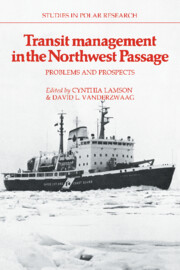Book contents
- Frontmatter
- Contents
- List of figures
- Acknowledgments
- PART I PERSPECTIVES ON THE PROBLEM
- 1 The Northwest Passage: a contrast of visions
- Post scriptum
- 2 The environment of the Northwest Passage
- 3 The development of Northern ocean industries
- 4 Arctic marine transport and ancillary technologies
- 5 Canadian arctic marine transportation: present status and future requirements
- 6 Northern decision making: a drifting net in a restless sea
- 7 Constitutional development in the Northwest Territories
- PART II PARADIGMS AND PROSPECTS
- APPENDIX: Statement on Canadian sovereignty
- CONTRIBUTORS
7 - Constitutional development in the Northwest Territories
Published online by Cambridge University Press: 26 March 2010
- Frontmatter
- Contents
- List of figures
- Acknowledgments
- PART I PERSPECTIVES ON THE PROBLEM
- 1 The Northwest Passage: a contrast of visions
- Post scriptum
- 2 The environment of the Northwest Passage
- 3 The development of Northern ocean industries
- 4 Arctic marine transport and ancillary technologies
- 5 Canadian arctic marine transportation: present status and future requirements
- 6 Northern decision making: a drifting net in a restless sea
- 7 Constitutional development in the Northwest Territories
- PART II PARADIGMS AND PROSPECTS
- APPENDIX: Statement on Canadian sovereignty
- CONTRIBUTORS
Summary
Introduction
Almost eighty years after responsible government was withdrawn from the Northwest Territories (NWT), current initiatives now seek its restoration through the creation of one or more Northern provinces. Dismissed for decades as merely a residual territory of the federal government, the NWT is now considered by some to merit greater stature in Canadian politics. However, a number of obstacles inhibit rapid change. For example, there is still no consensus regarding the resolution of the political conflict between theoretical entitlement to responsible government and the practical requirements of political autonomy. The North deserves the former but, at present, is ill-prepared to undertake the latter. Whereas claims for provincial status may be premature, the quest for an improved and more representative Northern government does not preclude the vigorous pursuit of intermediate goals. Specifically, a redefinition of the federal–territorial relationship and division of powers could greatly advance the Northern cause. Since this relationship is not defined by any constitutional document but merely by federal legislation, it is particularly malleable and easily amended. In addition, the relationship is sufficiently ill defined that traditional federalist doctrine may not be applicable.
Being the body which will ultimately effect any constitutional changes in the NWT, the federal government will examine closely the various criteria related to development prior to acting. Questions such as the North's fiscal dependence on the federal government, and Northern claims to greater control of resources in an attempt to alleviate financial reliance are particularly important.
- Type
- Chapter
- Information
- Transit Management in the Northwest PassageProblems and Prospects, pp. 251 - 276Publisher: Cambridge University PressPrint publication year: 1988



